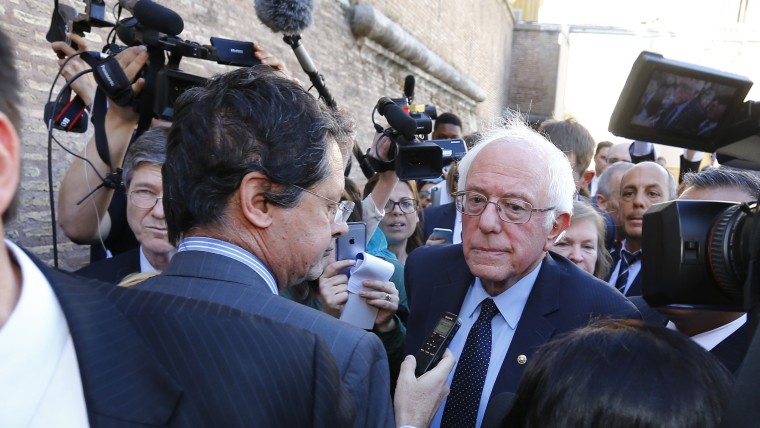MADDOW: Is there a point of friction between the case that Senator Sanders has made for people power, basically, for this not being decided by the establishment, for the Democratic party insiders not doing this and it being the will of the voters and shouldn't be something that gets decided in back rooms, it gets decided in public. Is there a point of friction between that strategy that you're describing state by state, also the superdelegate strategy that you guys have talked about for the convention, and the way he's talked about how he wants to win? DEVINE: I don't think there is. I mean, these are the rules. Unlike the Republicans --Trump in particular -- you know we're not going around saying you know everything's rigged and running against the rules. The rules are as they are. We may not like the way the rules are set up in some places but we've agreed to play by them. So, you know we'll work hard under the rules of caucus states, we'll work hard in other places. The superdelegates are there. We're gonna work hard to earn their support. I think we'll be able to do that if we succeed. Listen, the key test is succeeding with voters. In 2008 I wrote a piece that they published in the New York Times right after Super Tuesday. And I argued that superdelegates should wait, should look, and listen to what the voters do and follow the will of the voters. And I can tell you I got a lot of pushback from the Clinton campaign at the time, you know, when I published that piece. But I believe that today, that our superdelegates, that our party leaders should let the voters speak first. And I think if they do that all the way through the end of voting that will strengthen our party, and certainly strengthen our hand if we succeed with voters between now and June.
Team Sanders' delegate strategy under the microscope
It seems Bernie Sanders' campaign manager and chief strategist aren't saying the same thing about the road ahead.

Bernie Sanders has said many times that he'd much prefer to talk about his core issues than about the electoral process, but given the state of the race for the Democratic nomination, the importance of the process is hard to overlook.
In the wake of Hillary Clinton's easy primary victory in New York, the arithmetic doesn't appear to be working out for the Vermont senator. Facing a shrinking calendar, Sanders faces a deficit among pledged delegates -- the delegates earned through primaries and caucuses -- that will be extremely difficult to close by the time voting wraps up on June 14.
The question, however, is what happens then? Is Team Sanders prepared to ask Democratic superdelegates -- party officials and insiders -- to override the will of the voters? It now appears that depends on whom you ask.
For Jeff Weaver, Sanders' campaign manager, the answer is yes. Weaver told MSNBC's Steve Kornacki on the air on Tuesday night that Team Sanders is moving forward with a plan in which the Democratic race is "determined by the superdelegates." Asked whether the Sanders campaign would urge superdelegates to give the senator the nomination, even if Sanders comes in second place in the fight for pledged delegates and popular votes, Weaver added, "At this point yes, absolutely."
Mark Longabaugh, a top aide to the senator, told the Huffington Post largely the same thing yesterday. Even if Clinton wins a majority of pledged delegates, Longabaugh said, the Sanders campaign intends to keep going, taking the fight to superdelegates who can overrule voters.
The question is whether or not Sanders' top aides are all on the same page.
Devine's argument, in effect, is that superdelegates can and should wait to see what happens. Clinton is positioned to end up earning the most pledged delegates, but the process isn't over until mid-June, at which point these party officials and insiders can make a determination.
Devine argued in 2008 that superdelegates should "follow the will of the voters," and he seemed to suggest to Rachel last night that he hasn't changed his mind.
But 24 hours earlier, Devine's colleague, Jeff Weaver, made a very different kind of argument, making the case that superdelegates should see Sanders as the stronger candidate -- even if Democratic voters make a different determination.
In fact, given an opportunity last night to endorse Weaver's stated plan, Devine demurred. "Let's see who has won the states, let's see who's won the delegates, let's see where we are in June," he said. "And I think then we'll know what to do."
And while that certainly sounds reasonable, on Tuesday, Sanders' campaign manager said he already knows what to do: lobby superdelegates to overlook the pledged delegate results.
It's not unusual for a presidential candidate to have different aides offering different strategies, and sometimes it's a good thing for a candidate to get different kinds of input. But Team Sanders is in a tough spot right now, and at least on the surface, it seems the senator's campaign manager and chief strategist aren't saying the same thing about the road ahead.
For what it's worth, if Weaver is right, and the Sanders campaign intends to proceed with a gambit that involves overruling the will of the voters, prominent progressive groups, including MoveOn.org, have said they're not on board with such a move.